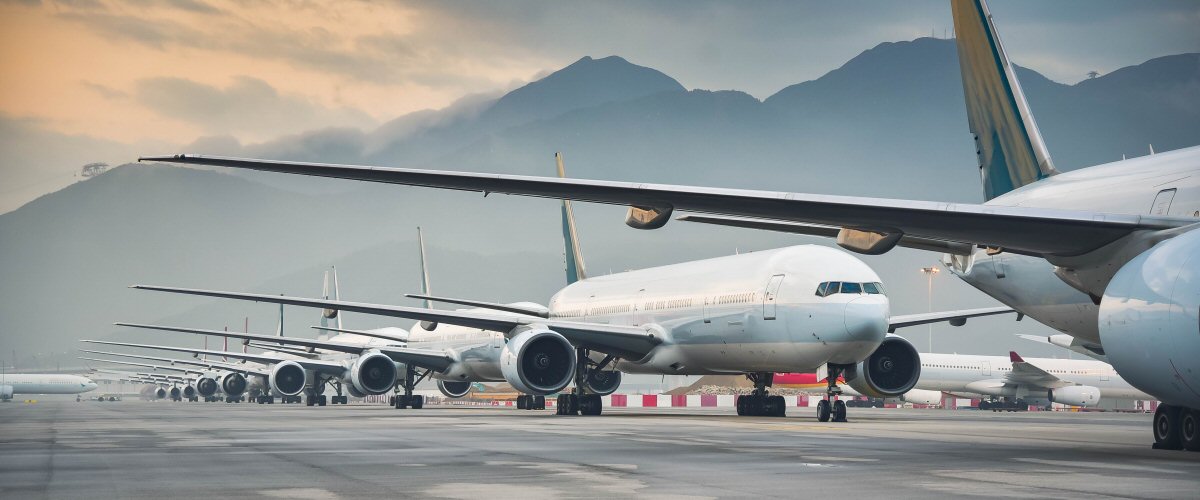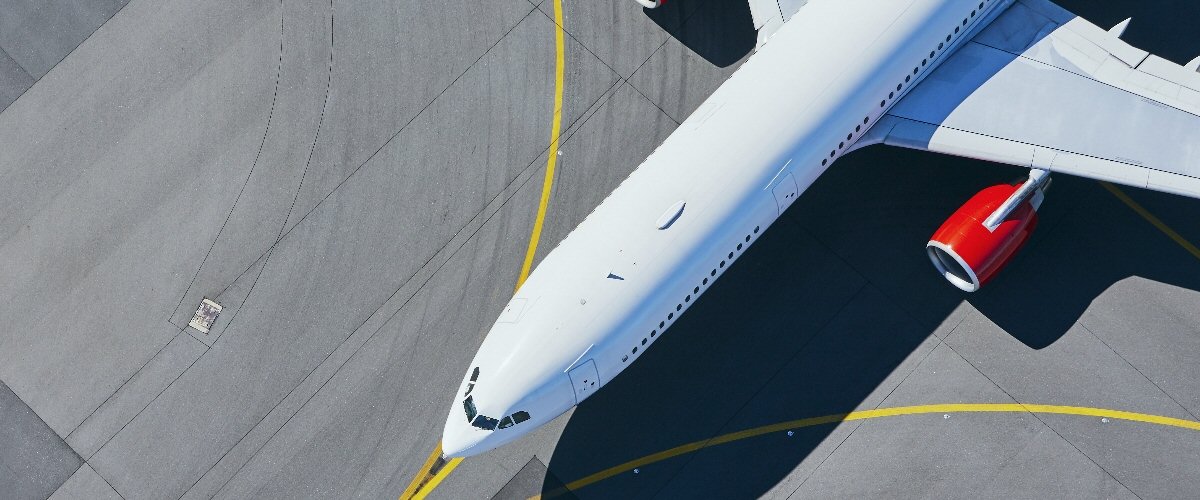Date: 19/01/2024 (Edition 1) Download PDF
.png)
Happy New Year to everyone in the industry. I hope 2024 proves to be a healthy one for all of you. That is except for the last week in January as a few thousand of us brave the icy winds in and around the Shelbourne & RDS and hold back from a perfect dry January resolution.
What’s likely to be the main theme this year at the conferences? Well, judging by the sheer number of keynotes with the lessor CEOs, the room should be quite full on Monday. Clearly, the message is going to be one of exuberant positivity! So, no change there then. That is until the OEM panel comes on!
However, in terms of what I expect to hear from the lessor CEOs and the outlook for 2024, increased trading is something I’m expecting to see this year, as is the continued movement of values and lease rates. The fall guy, however, continues to be the supply chain, a subject we are bored to death with. Last year ended with the hope that the GTF issue wasn’t going to be quite as bad as initially thought, whilst we enter this year with yet another MAX issue to potentially contend with. The pain goes on… and on… and on …
That being said, aircraft are being delivered, just not quickly (or reliably) enough to take full advantage of apparently unshakable passenger demand before the impact of inflation stops everyone in their tracks. Our memories tell us that the cliff is out there – just beyond the fog in fact. And that is central to the problem. The current consumer growth defies traditional Western economic scepticism. The price of everything goes up, yet demand remains high? Whilst on the aircraft investment side, pricing and lease rates have been shooting up yet caution remains amongst Investors until they become more comfortable with reading this cycle.
Still, that’s the fun of the cycle. We all know how this plays out, but the finer details are still being worked out.
Just a few things to highlight for the coming two weeks. Myself, Mike and Dan will be presenting IBA’s latest Market Update next Wednesday. A large group of the IBA team will of course be in Dublin so please reach out if you haven’t already done so. The same trio will be hosting a Breakfast Briefing at 8 AM on the Tuesday morning (30th January), just across from the Shelbourne at the Royal College of Surgeons in Ireland. Instead of the normal presentation format, we will be doing this as a fireside chat panel to stimulate dialogue. Several of us will also be presenting at both Airline Economics events during the week. Mike is on the Appraiser panel on the Wednesday morning, whilst I have been given the 4 PM slot on Wednesday to explore the whole supply & demand effect. I promise to not make it heavy!!
Sláinte
From talking about Alaska before the holidays, the story shifts to Akasa, or rather Boeing and their fresh issues to greet 2024. The aviation news of the 737-9 loose bolts spread into the mainstream news because of the not-forgotten 2019 MCAS issue. Akasa’s order doesn’t actually include the affected variant (made up of an unconfirmed split of 737-8-200s and 737-10s) but they will have no doubt used it as a negotiation chip. Of course, one needs to look at the other recent orders though…
As soon as IBA’s newsletter (now rebranded as The IBA Insider!) took a break it seems airlines and lessors went holiday shopping Lufthansa (80), Avolon (140), easyJet (157) and Turkish (220, finally) ordered 597 aircraft between the four of them in December. With options, that number rose by another 200. Before either of the Boeing quality issues (there was also a rudder bolt issue, that was revealed less dramatically) reached news, Airbus accounted for 517 (87%) of those orders. That included Turkish Airlines’ 70 orders for the A350. Widebodies had been a safe haven for Boeing amid the great territory loss in narrowbodies. However, the backlog share of Airbus is now up two percentage points from November to 38%. Strictly speaking, you could say they were roughly even if you count Airbus finally striking off Iran Air’s 97 largely A330ceo order, but I don’t think anyone believed in that for years!
The 737-9 issues were fortunately narrow in breadth in the short term, however, it does not end there. Another interesting story in that order backlog is that over half of those orders (351 aircraft) were for the A321. Earlier in 2023 Piotr talked about an upgauging trend; that has continued. Ryanair has 150 737-10s on order but CEO, Michael O’Leary highlighted his belief that the 737-10’s certification will now get pushed back to 2025 because of the 737-9 issue. With Boeing’s answer to the A321 being delayed, they are likely to lose even more ground in the narrowbody space.
Turning to the other side of the story in Akasa Air, a 150 aircraft order for the carrier is very bullish, especially since they only have 22 currently in service and already 54 in production. This is a ratio of 927%, over treble that of IndiGo (275%), despite IndiGo’s 984 aircraft order backlog. Akasa will have to manage that risk being priced into their sale and leaseback terms on top of any pre-delivery payments Boeing may demand. India is definitely one of the most exciting growth markets at the moment, but it is also the setting of an upcoming great fight between IndiGo and Air India Group. Akasa may have bitten off more than they can chew.
Last November, IBA mentioned the serious regulatory threat challenging the potential merger between JetBlue and Spirit Airlines. This might have just tempted fate too much as two months later a US federal judge has ruled in favour of the Department of Justice, effectively stopping the transaction in its tracks.
JetBlue has argued that the merger is the only way to save Spirit Airlines from failing by creating effective competition against the “Big Four”. However, the DOJ’s prevailing argument was that the merger would eventually result in a fare increase, as leaked documents revealed plans to bring Spirit’s fares in line with JetBlue’s. The possible fare matching would result in a 40% fare increase, which wasn’t deemed to be in the consumers’ best interests.
The ruling might turn out to be a death blow for Spirit Airlines, for which JetBlue was seen as a knight in shining armour. After a series of unprofitable quarters, the airline saw its share price plummet a further 60% after the merger news broke in on Tuesday. Spirit might not be the only one in danger, as the US market is expected to continue cooling down in 2024. With yields falling Frontier, JetBlue, and Spirit reported Q3 2023 operating margins of -6.1%, -6.6% and -15.0% respectively.
With the American antitrust body flexing its muscles, all eyes will undoubtedly now turn to the merger between Alaskan Airlines and Hawaiian Airlines, which might be next on the chopping block.
Airline consolidation seems to have more traction in Asia, however. Following their recent exit from financially distressed status, AirAsia is poised to be sold by Capital A to AirAsia X with plans to combine their short and long-haul divisions. An analogous merger is being considered by Thai Air Asia and Thai Air Asia X. Additionally, the proposed merger between Korean Air and Asiana Airlines is reportedly expected to be approved by the European Commission after a long investigation. If true, that would leave only the US and Japan standing in the way. The question is whether the US will challenge this deal as zealously as the transactions on the domestic market.
Our weekly update looks at the key trends and market indicators using data and analytics provided by IBA Insight.



凭借由获奖 ISTAT 认证评估师组成的庞大团队以及 30 多年累积的专有数据,IBA 在全球估值市场上处于领先地位。我们为全球范围内的一系列资产类型提供独立、公正的价值意见和建议,包括飞机、发动机、直升机、货机/航空货运、降落机位和预备件等。IBA 始终致力于超越客户的期望,我们的客观意见为贷款、资产收回、商业开发和再营销提供了必要的安全保障。

IBA 与全球领先的飞机和发动机租赁公司精诚合作。我们的专业建议植根于深厚的行业知识,因此 IBA 可以在投资周期的各个阶段提供支持,让客户放心无忧。从估值、机队选择、投资组合开发,到租赁结束时的退租和再营销,我们将全程协助客户完成整个租赁期的所有风险评估和资产管理活动。

航空投资往往错综复杂,会涉及大量财务风险,因此,放任资产不去管理绝对是下下策。无论是首次投资的新手,还是市场上驾轻就熟的资深投资者,IBA 都能帮助您克服各种资产类型的复杂性,让您更好地了解各种投资机会。我们可以与您携手合作,支持您的投资组合开发、多元化发展并满足您的战略需求。

30 多年来,IBA 与全球和地区航空公司紧密合作,提供估值和咨询服务、航空数据情报以及飞机和发动机的退租支持。我们在遍布世界各地的各种航空项目上与客户展开协作,满足他们的额外资源需求,随时随地提供所需的项目管理支持。

我们掌握着丰富资源并善于出谋划策,可为客户提供诉讼支持和纠纷调解办法,并根据客户的法律策略量身定制周密的解决方案。正是由于 30 多年来专有航空数据的积累、定期参与战略并购,以及丰富的飞机管理专业知识,我们能够经常接触到各方之间的典型争端领域。IBA 通过直接或与客户自己的法律团队合作的方式,在各个方面为客户提供帮助,从飞机损坏或损失的保险相关理赔,到常常在退租时发生的租赁商与承租商的纠纷。